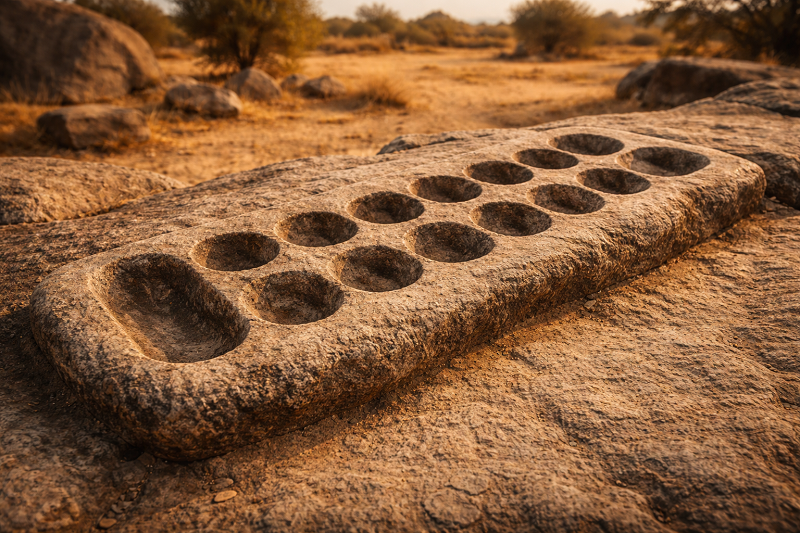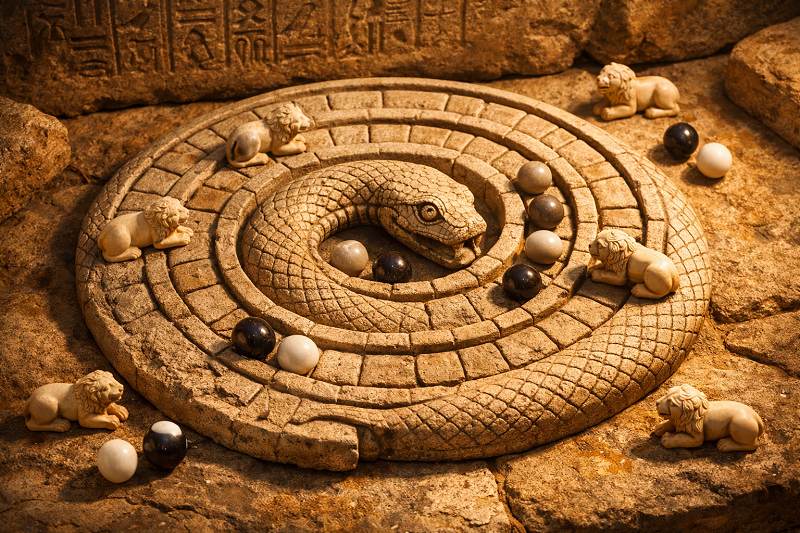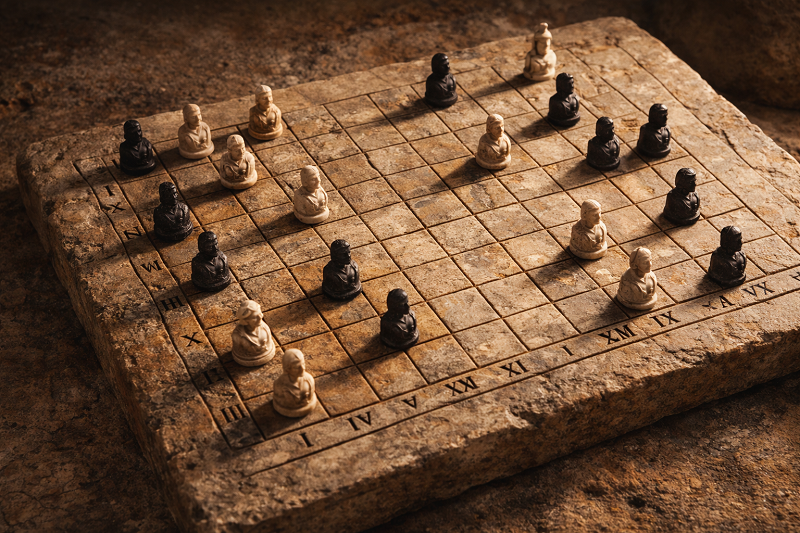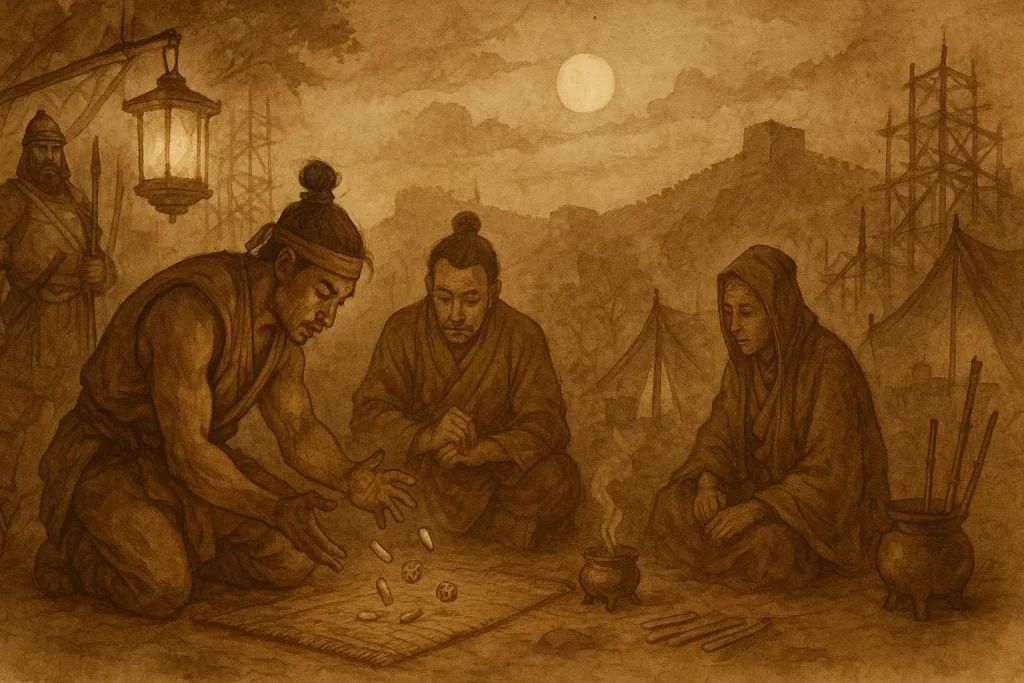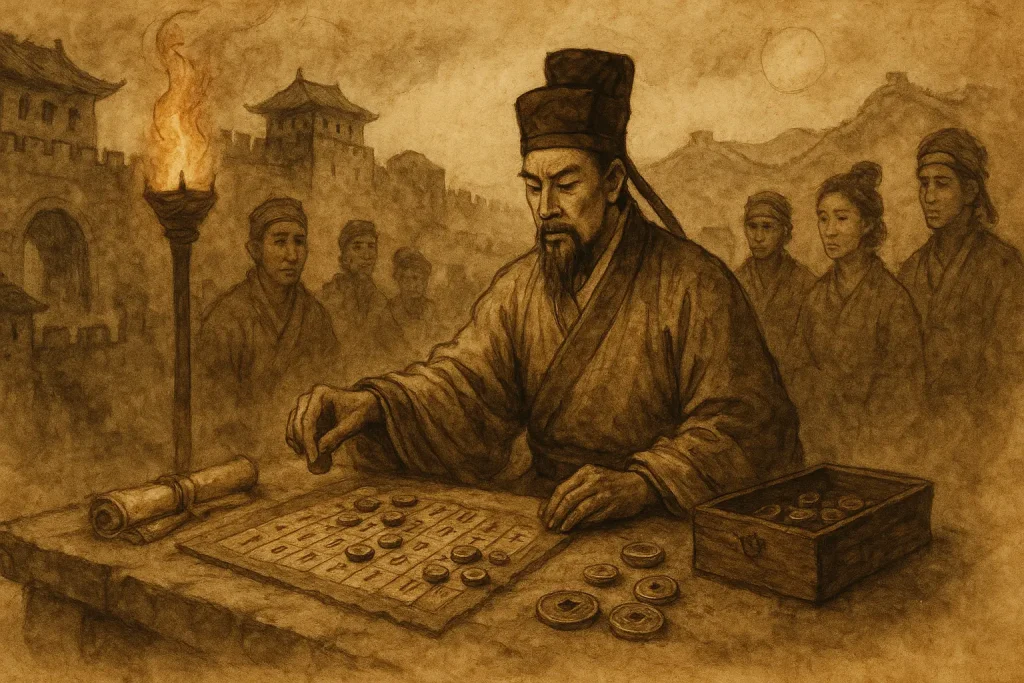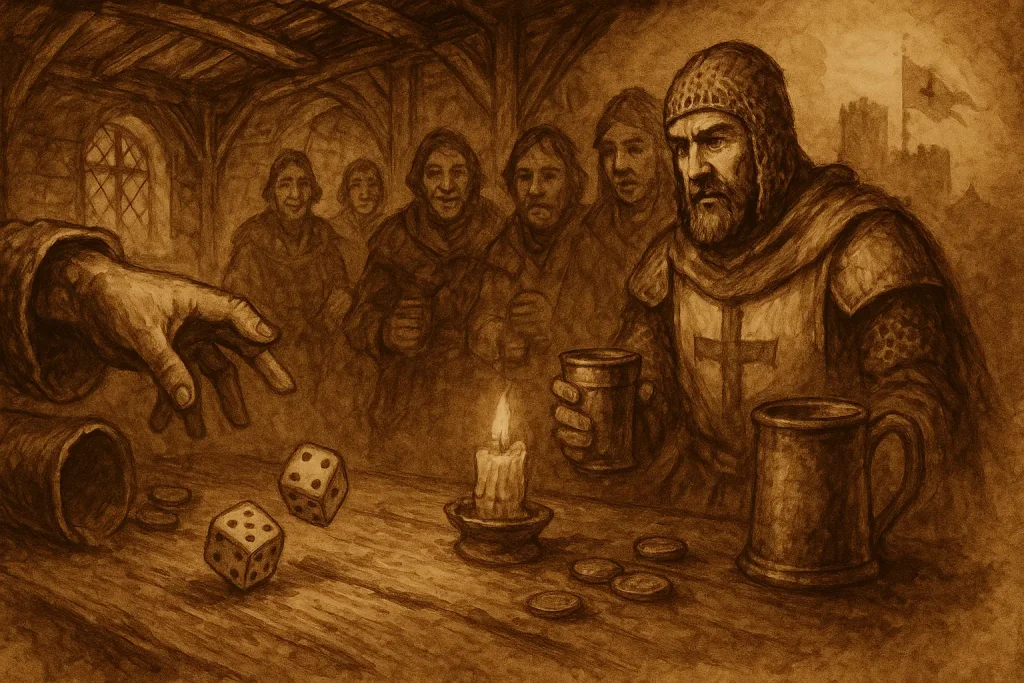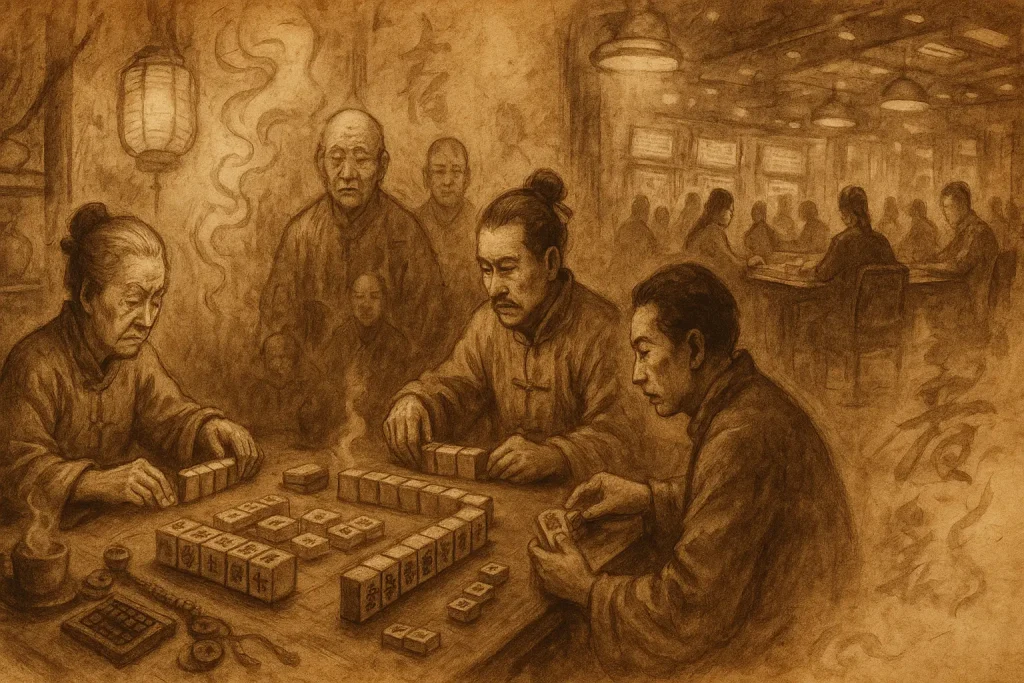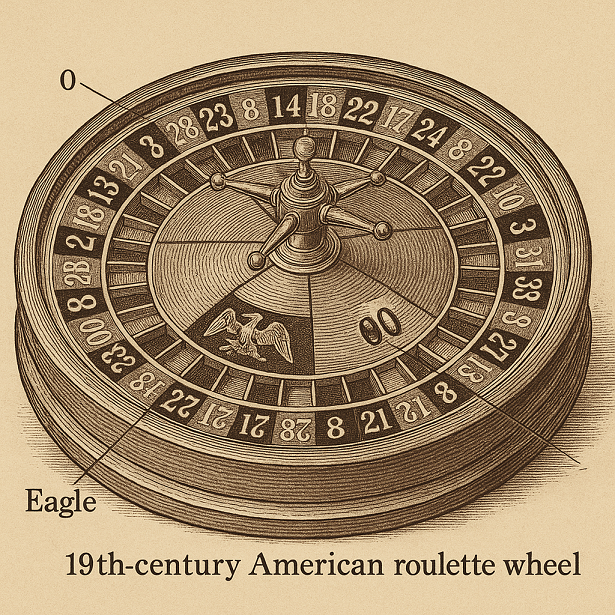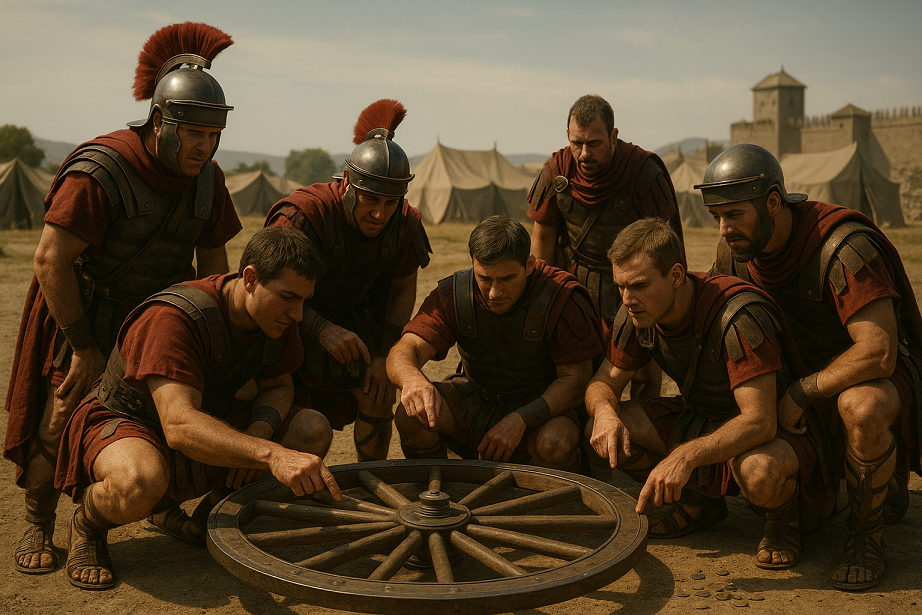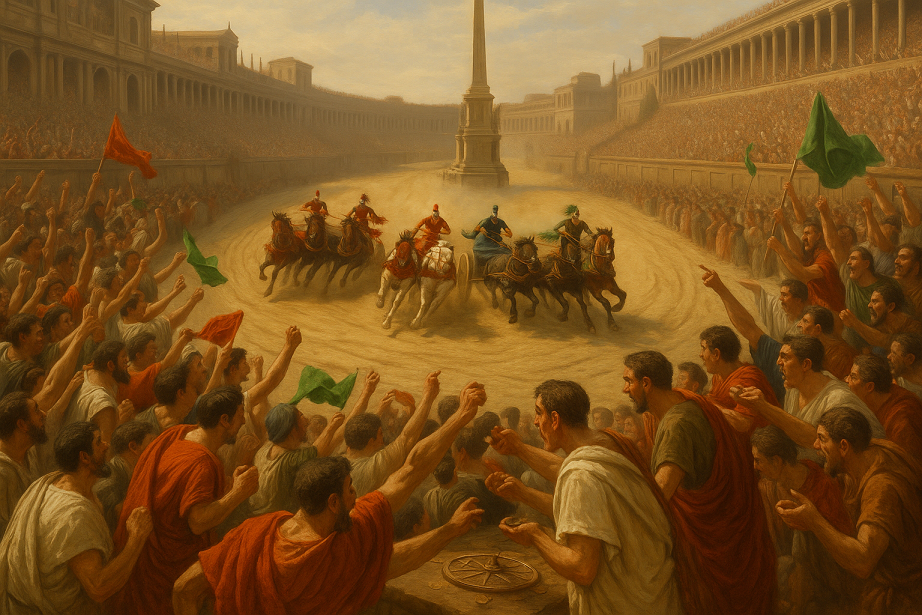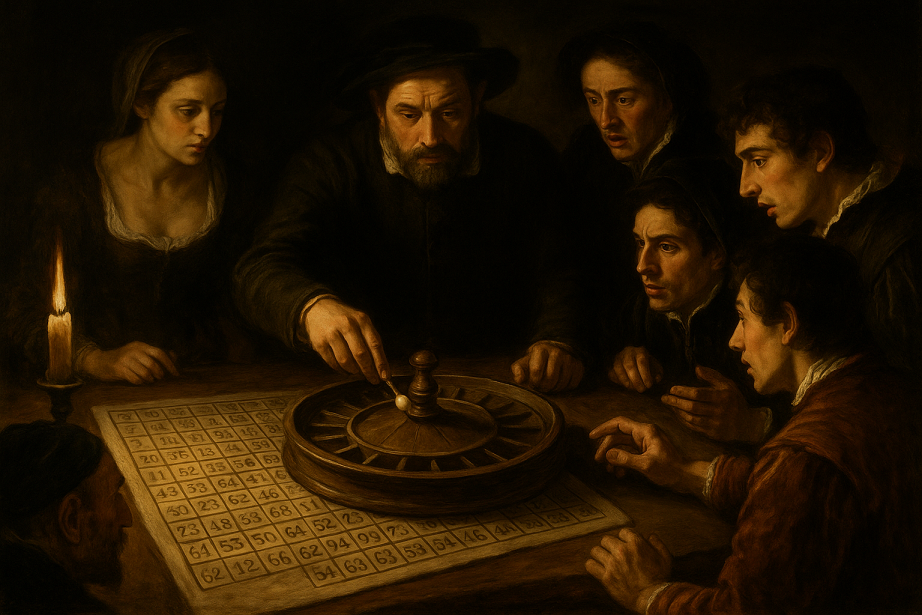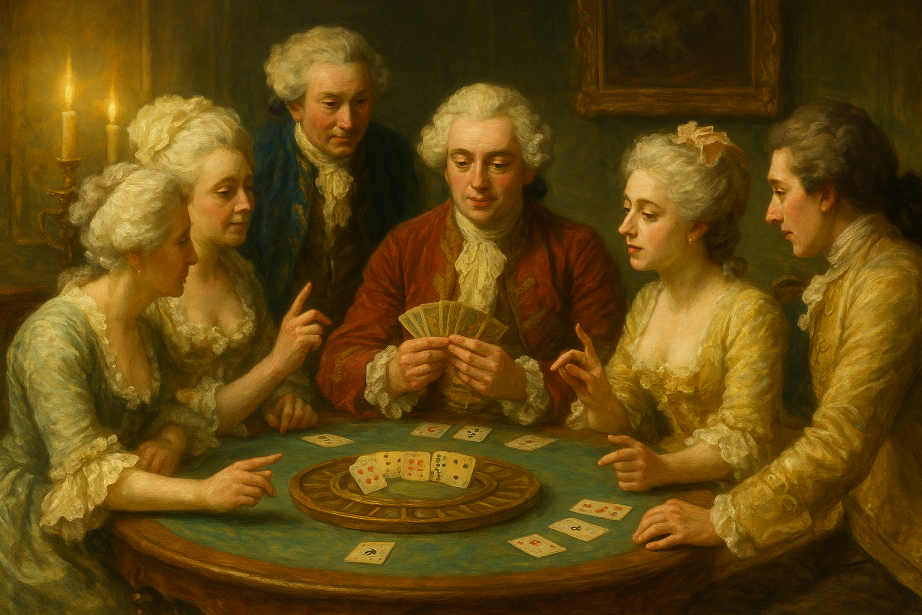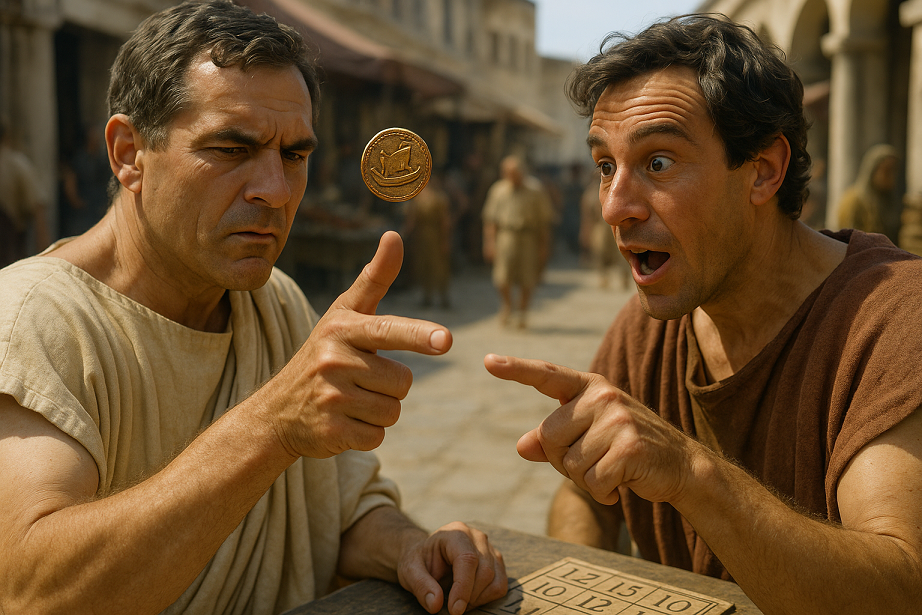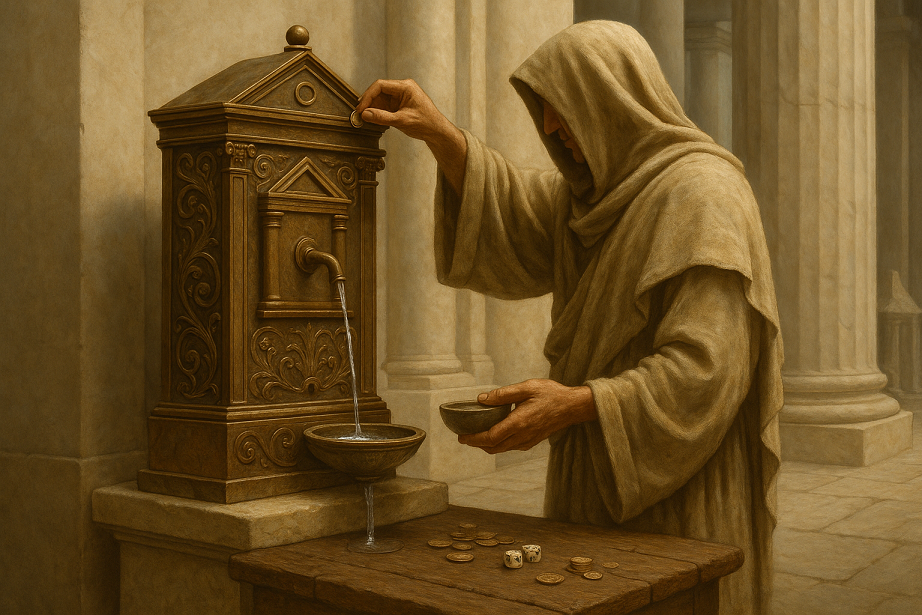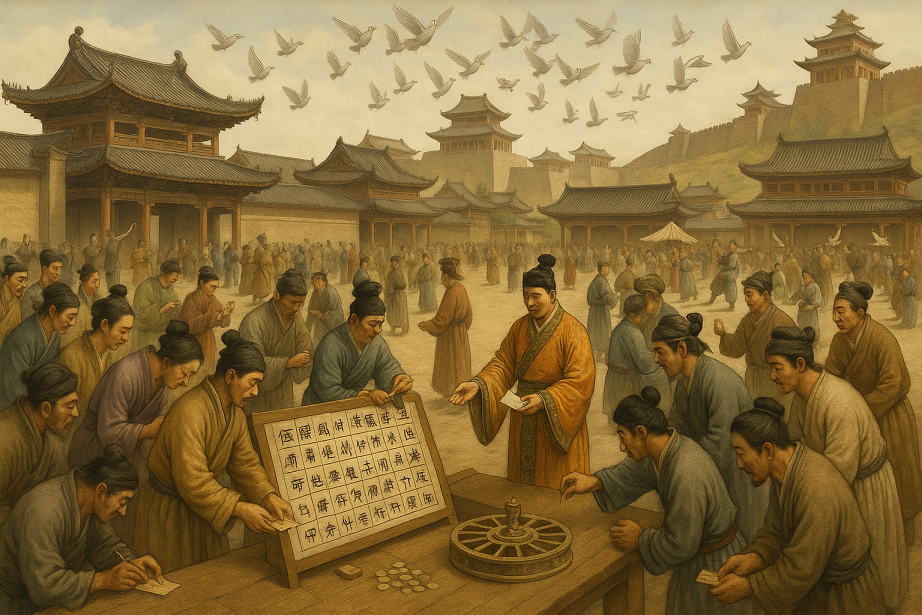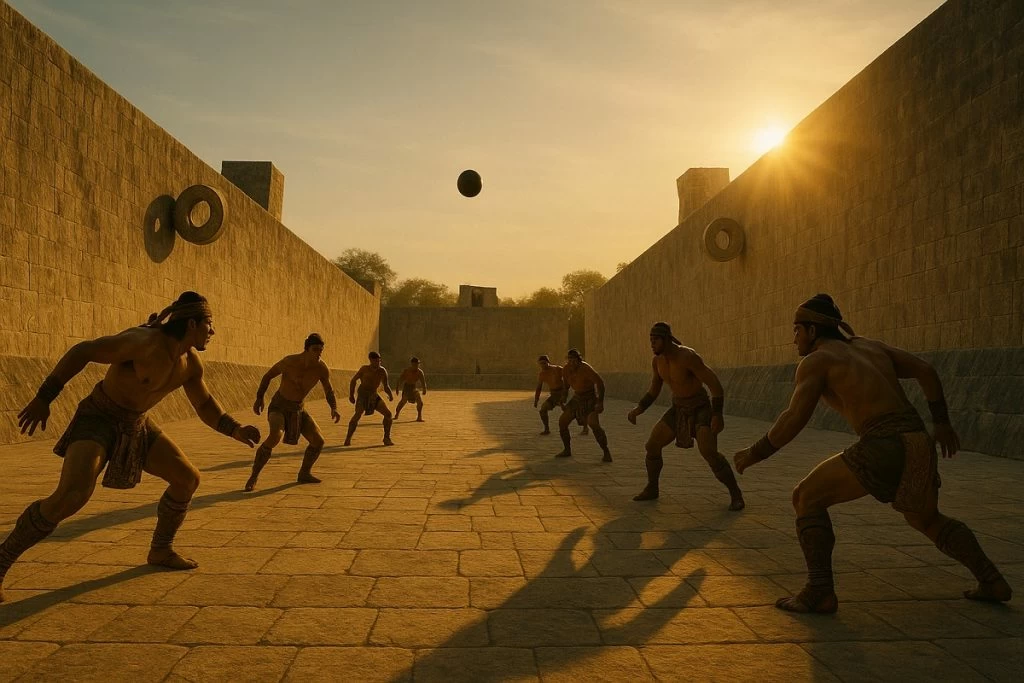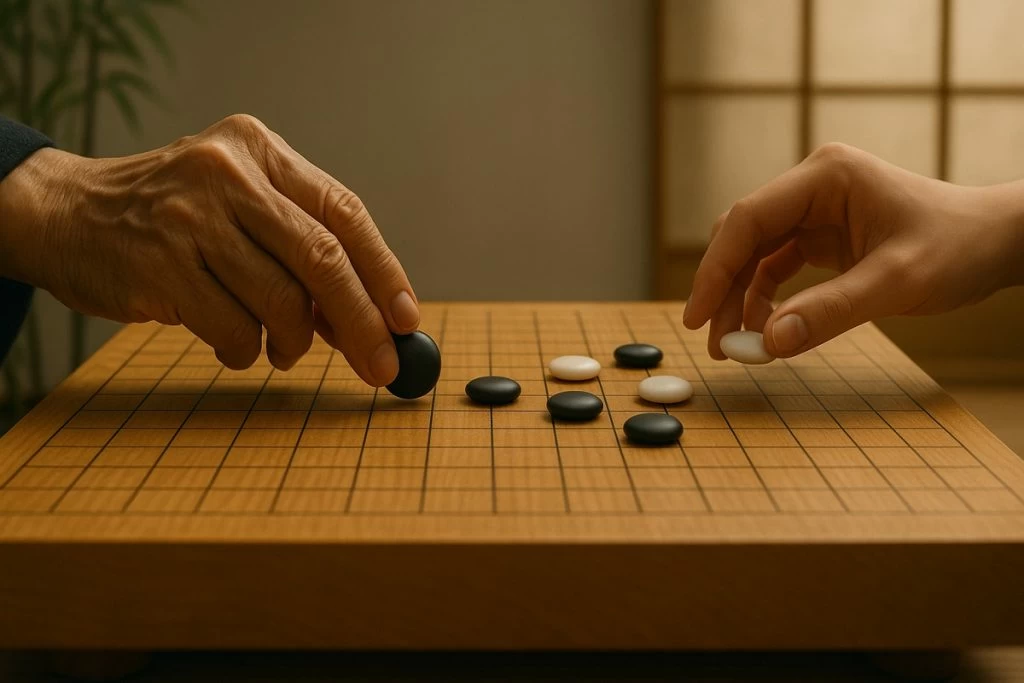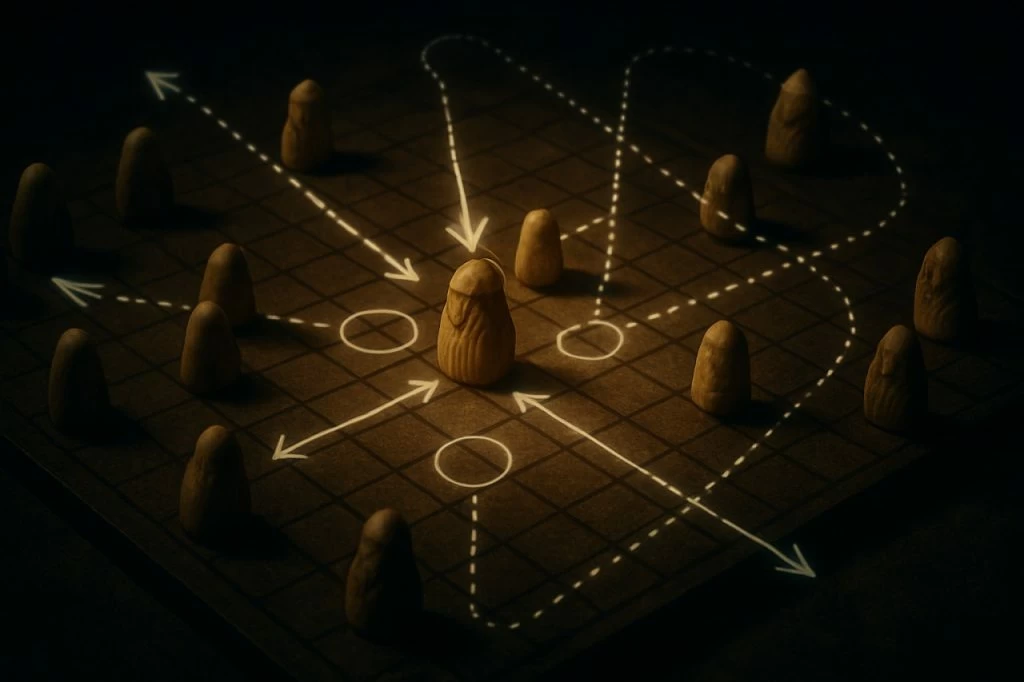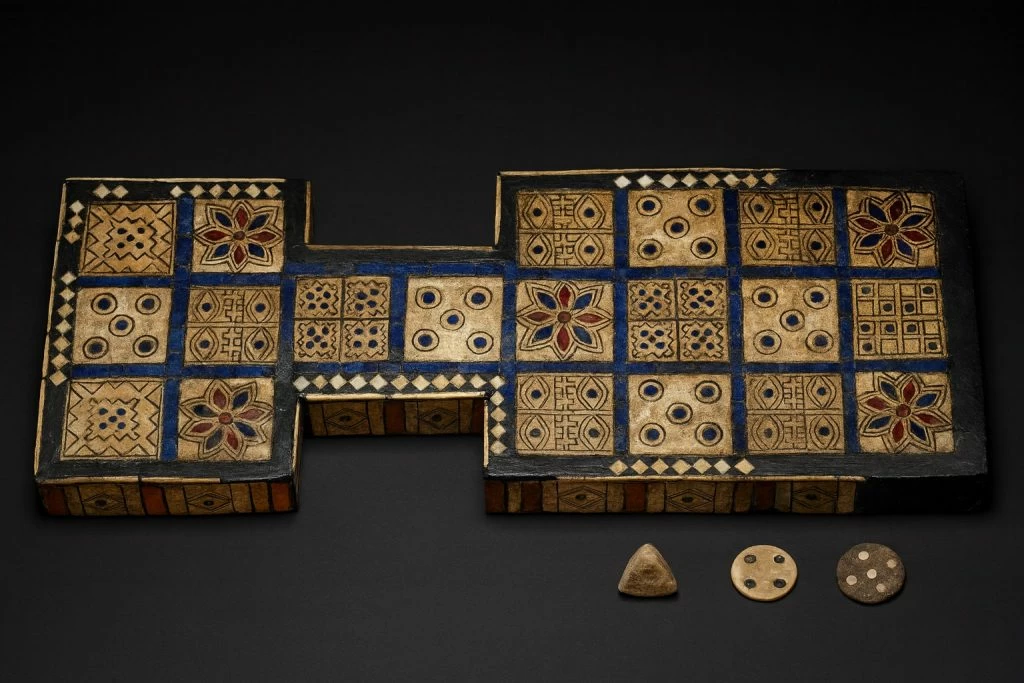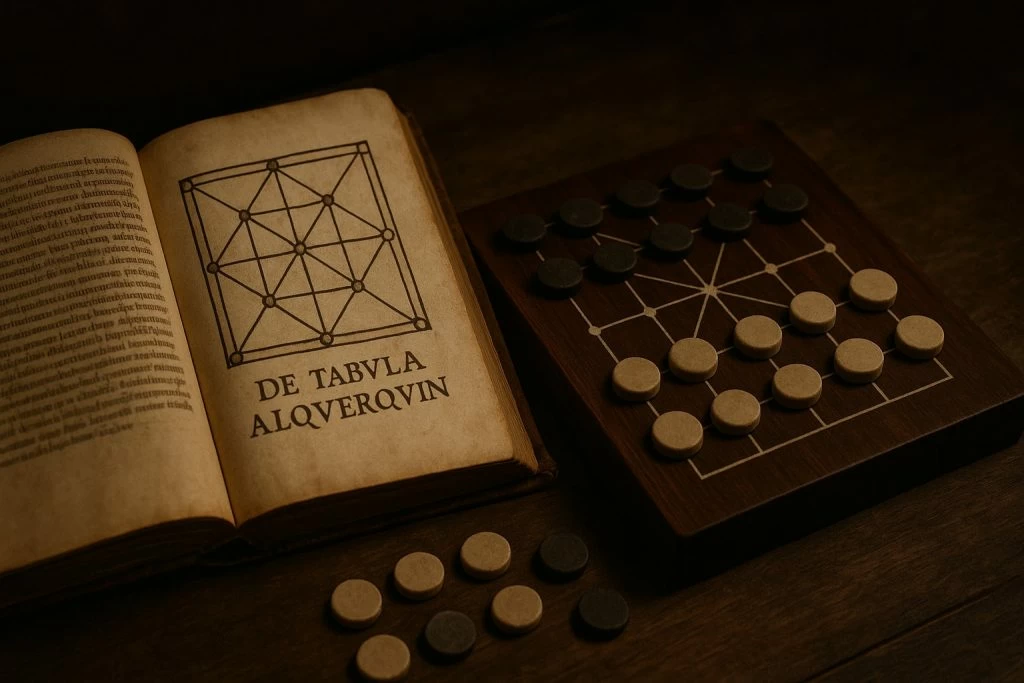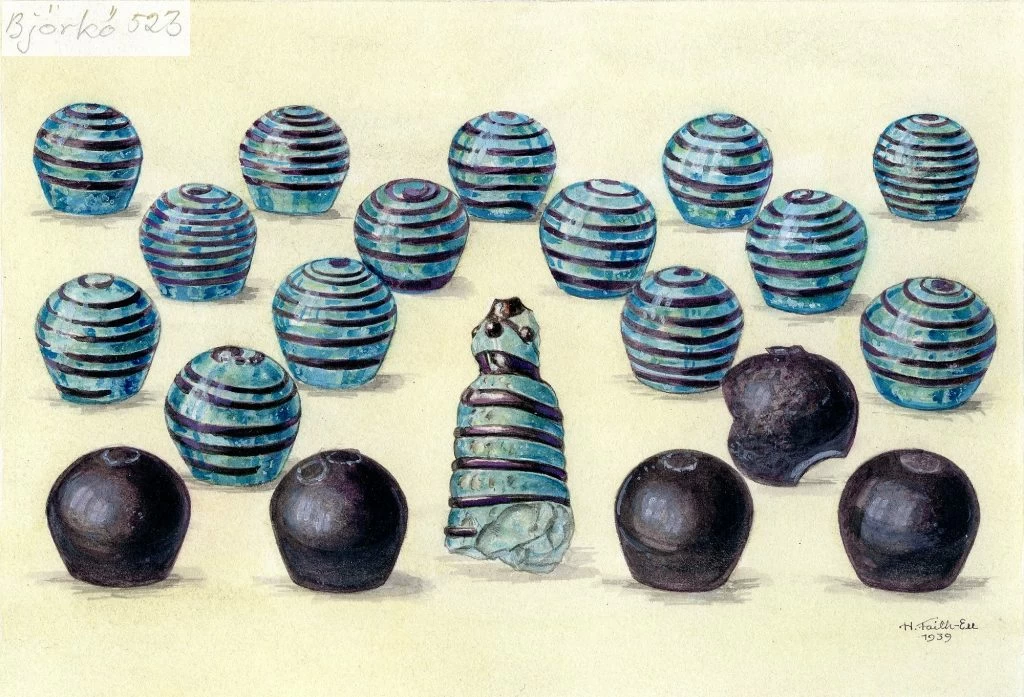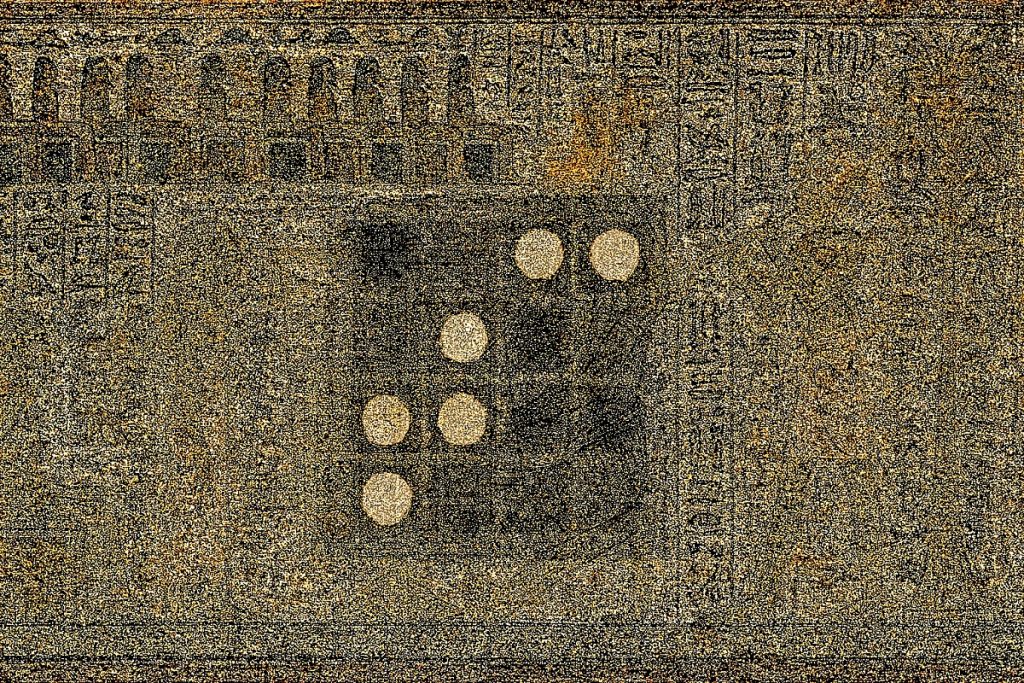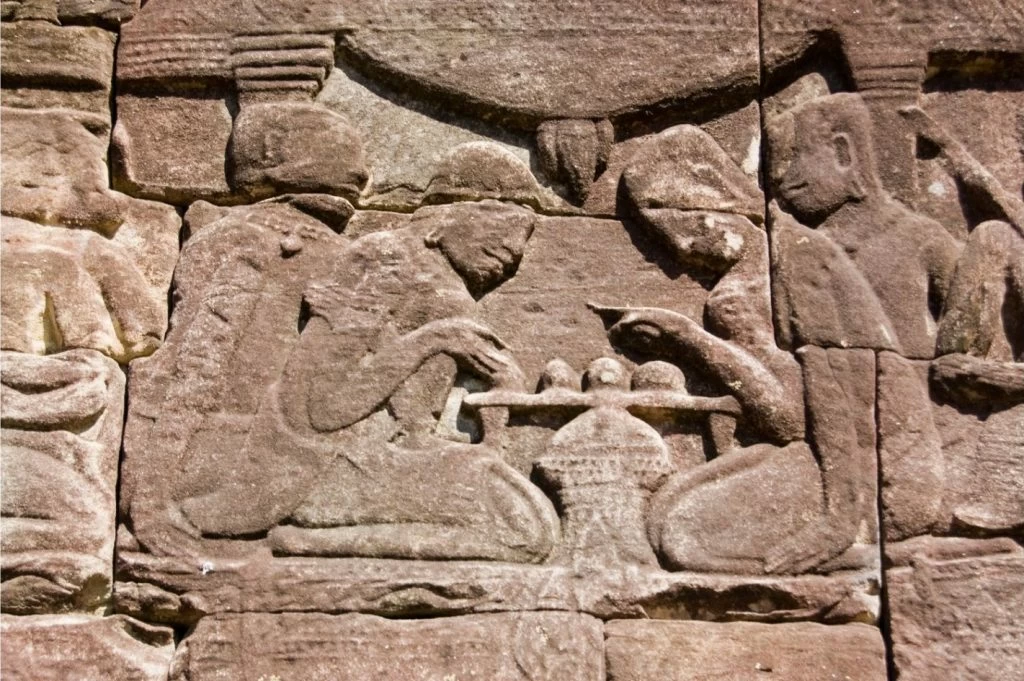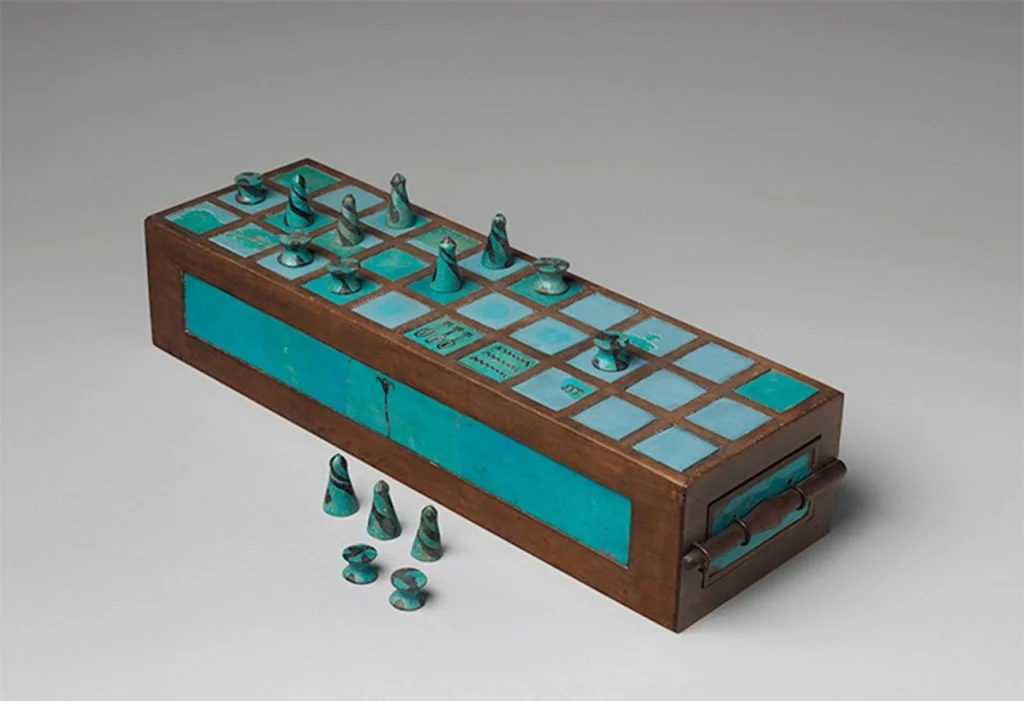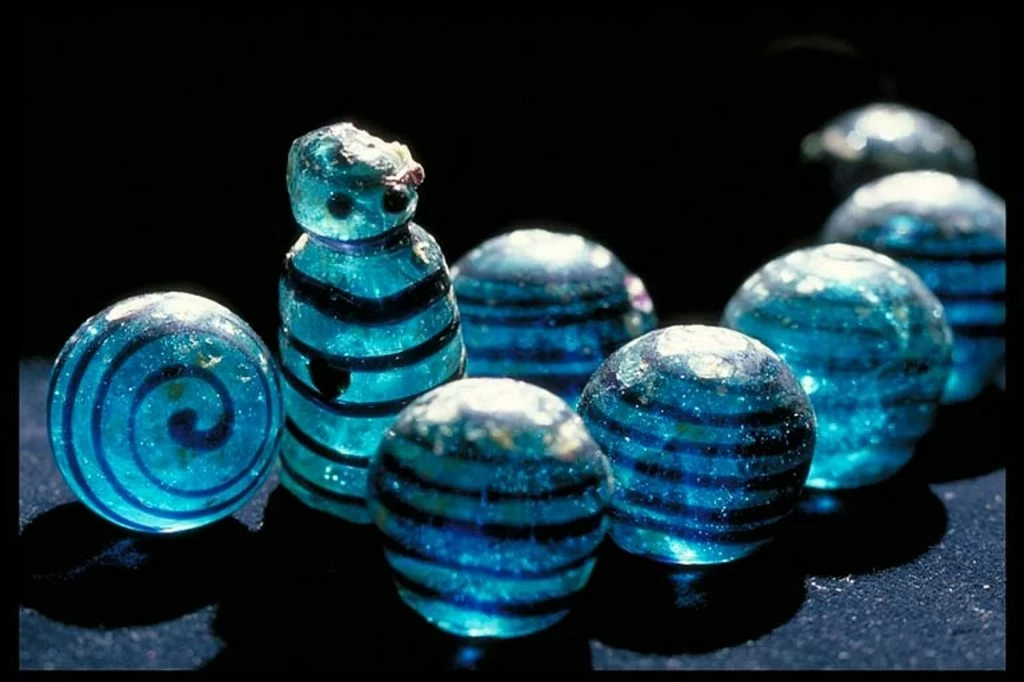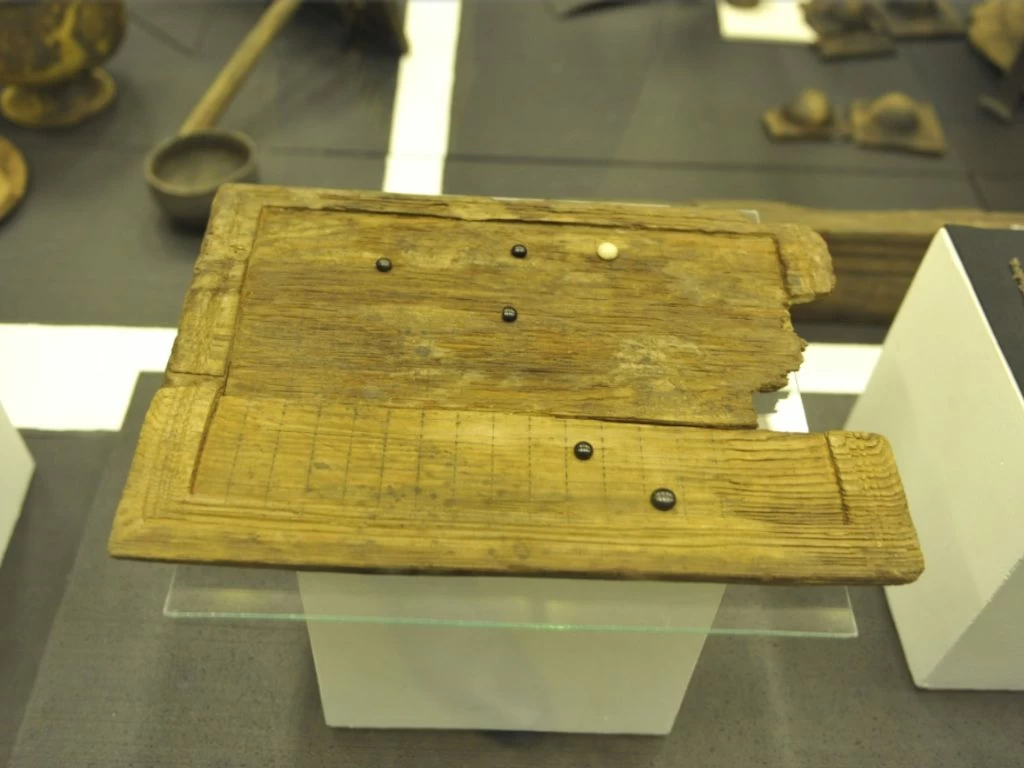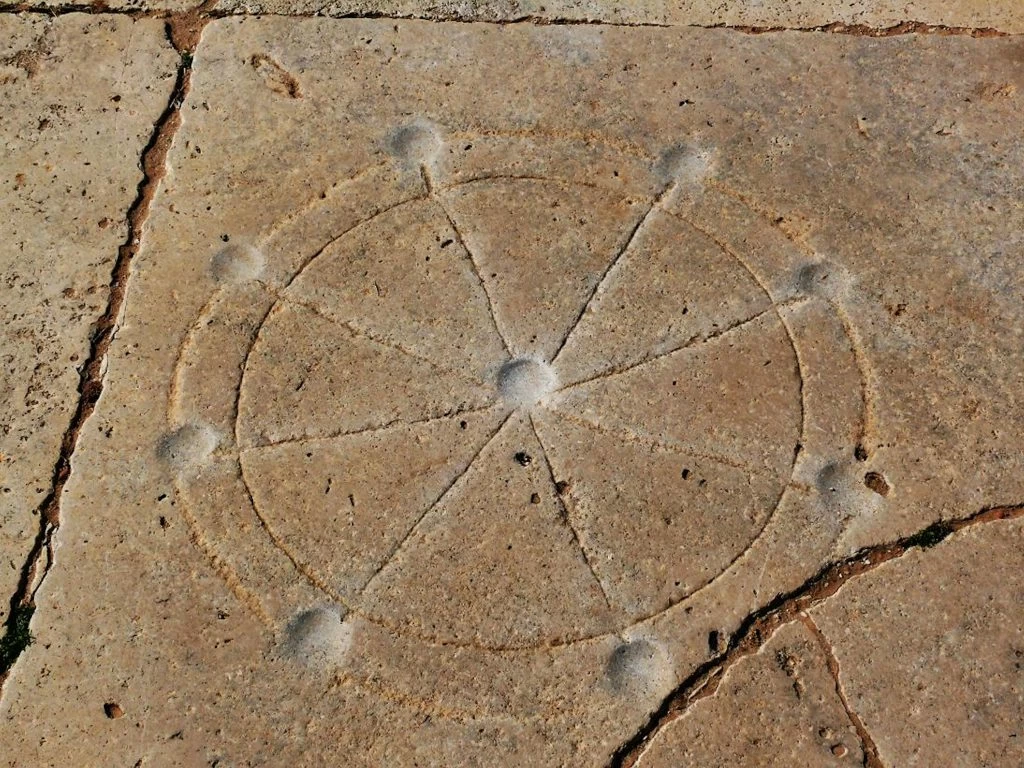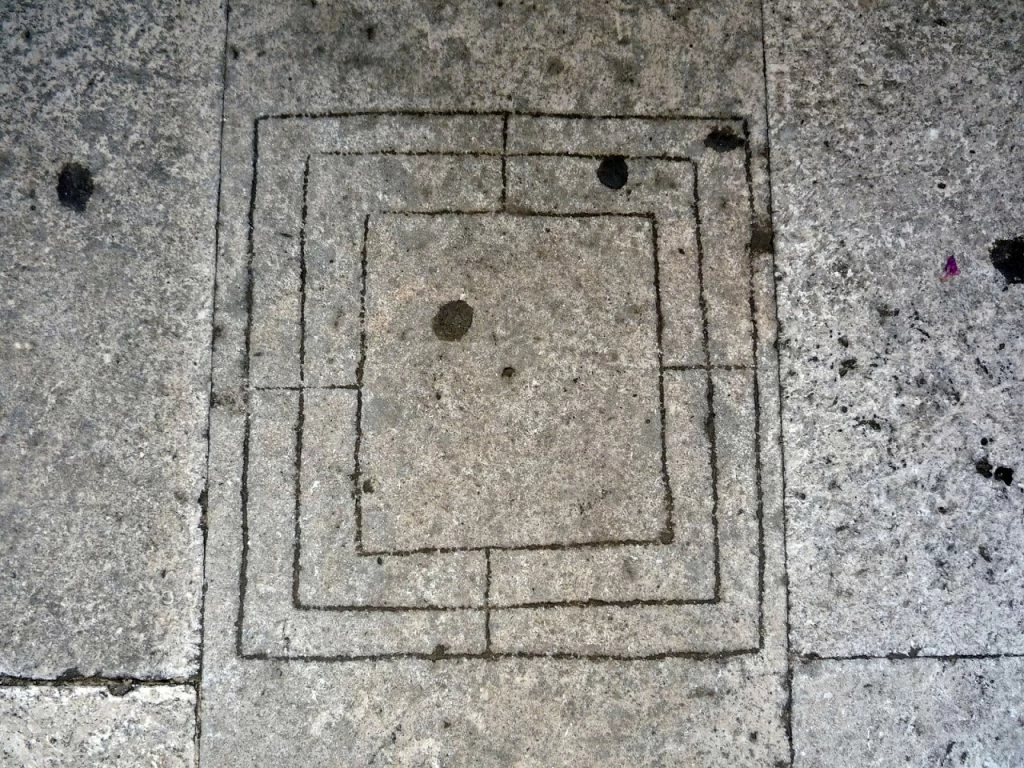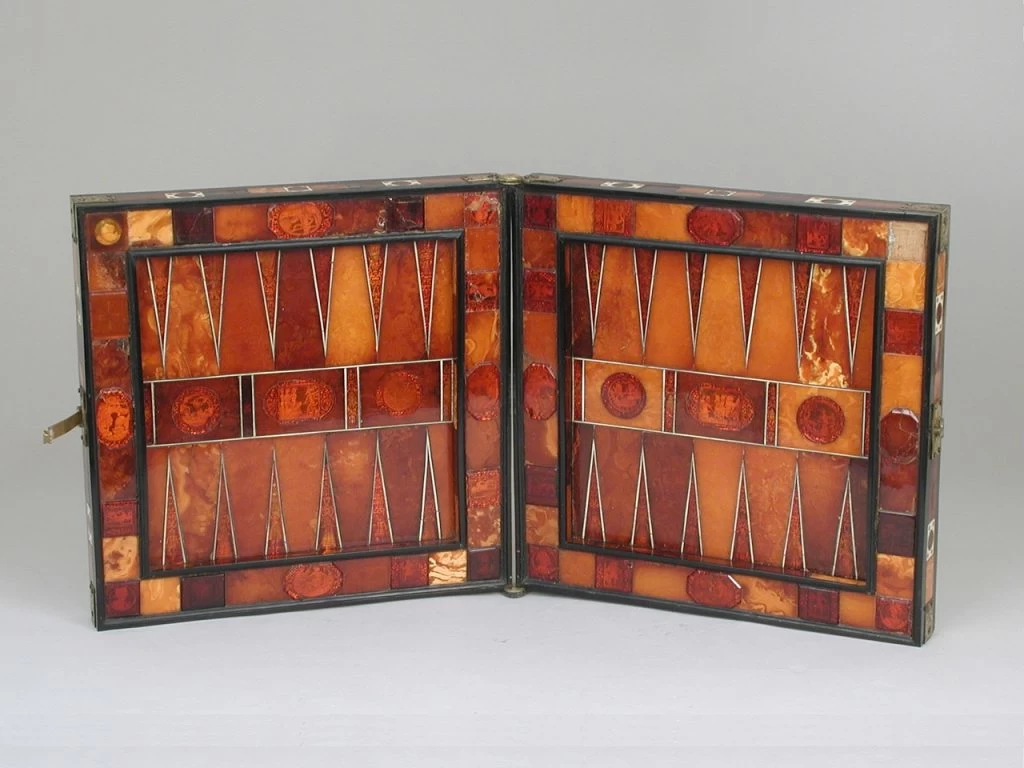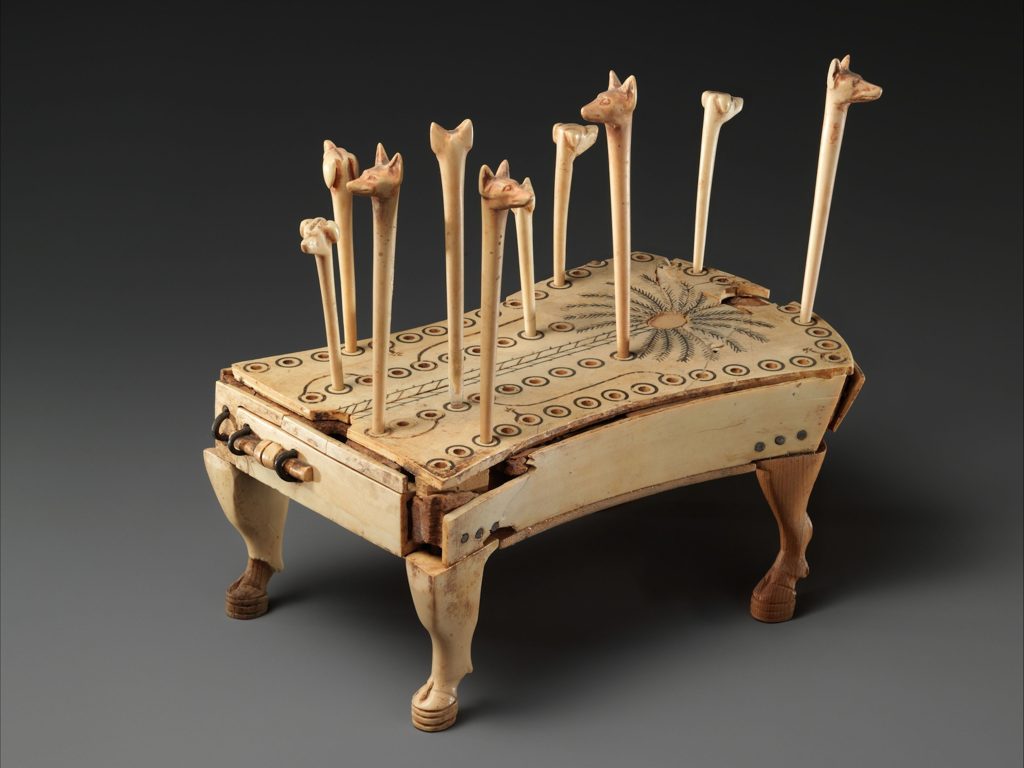Ancient Games
Let’s roll the dice and see where history takes us!
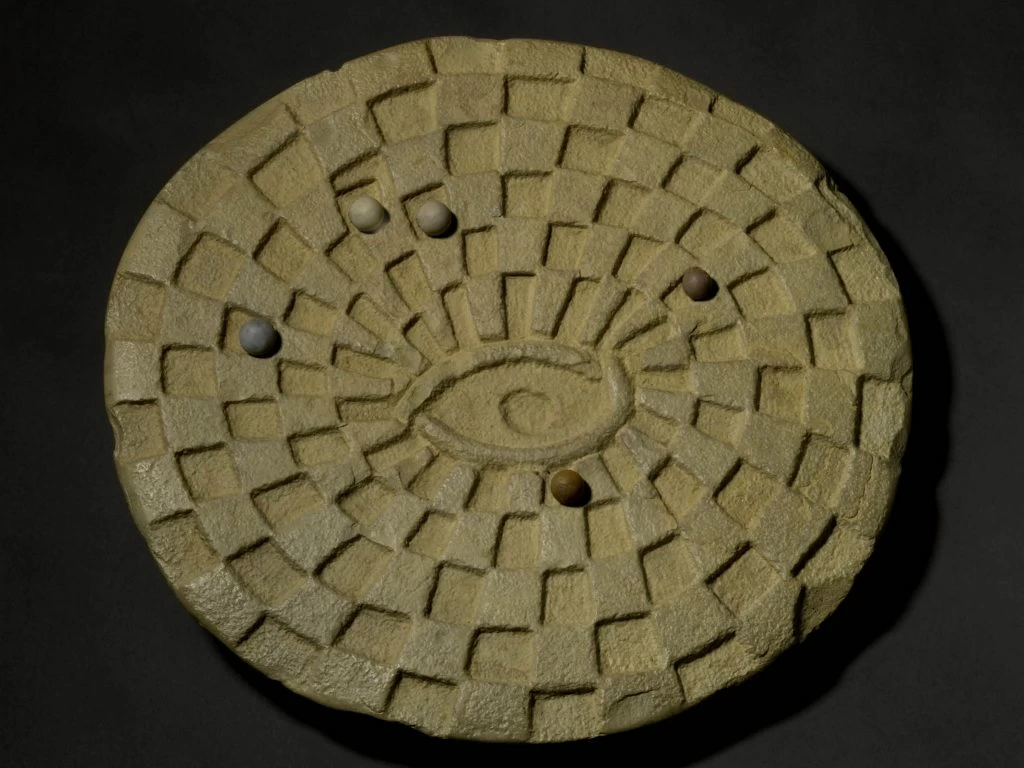
Mehen (pictured above) is an ancient Egyptian game, references to which have been found already in the predynastic period, before 3100 BCE. The game is a spiral in the shape of a coiled snake with the snake’s head in the center of the disk.
The genesis of games in ancient civilizations is a topic as fascinating as it is expansive. Games, in their various forms, have been a universal part of human experience, transcending cultures, geographies, and time periods.
Ancient games have long been a window into the past, revealing the cultural, intellectual, and social values of civilizations long gone.
These games, some dating back thousands of years before the common era, were not just pastimes but also tools for education, social interaction, and even spiritual practices.
The Role of Games in Early Societies
Long before the advent of modern technology, ancient civilizations were engrossed in a variety of games.
These activities, often deeply rooted in religious and cultural practices, served as a means of education and social interaction.
Games and Society
In ancient civilizations, games often mirrored the societal structures and beliefs. They were embedded with symbolic meanings and sometimes used for divinatory purposes. For instance, games in ancient Egypt were believed to be connected with the afterlife, offering a simulation of the journey of the soul. Similarly, in ancient Mesoamerican cultures, ball games held religious significance and were intertwined with myths and the cosmos. Interestingly, many modern casino games can trace their origins back to these ancient games, demonstrating the enduring appeal and evolution of gaming through the ages.
Many traditional games that originated centuries ago are still enjoyed today, both in physical form and through modern digital platforms. Card and table games such as blackjack and poker have evolved over time, and are now commonly found at the best online casinos around the world, including those available to players in Canada.
Early games used various materials like bones, shells, stones, and sticks, with some even serving divinatory functions. They were central to cultural and social bonding, used in teaching, and acted as markers of social status. For the elite, games like Senet and the Mesoamerican ball game held religious significance and were also diplomatic gifts.
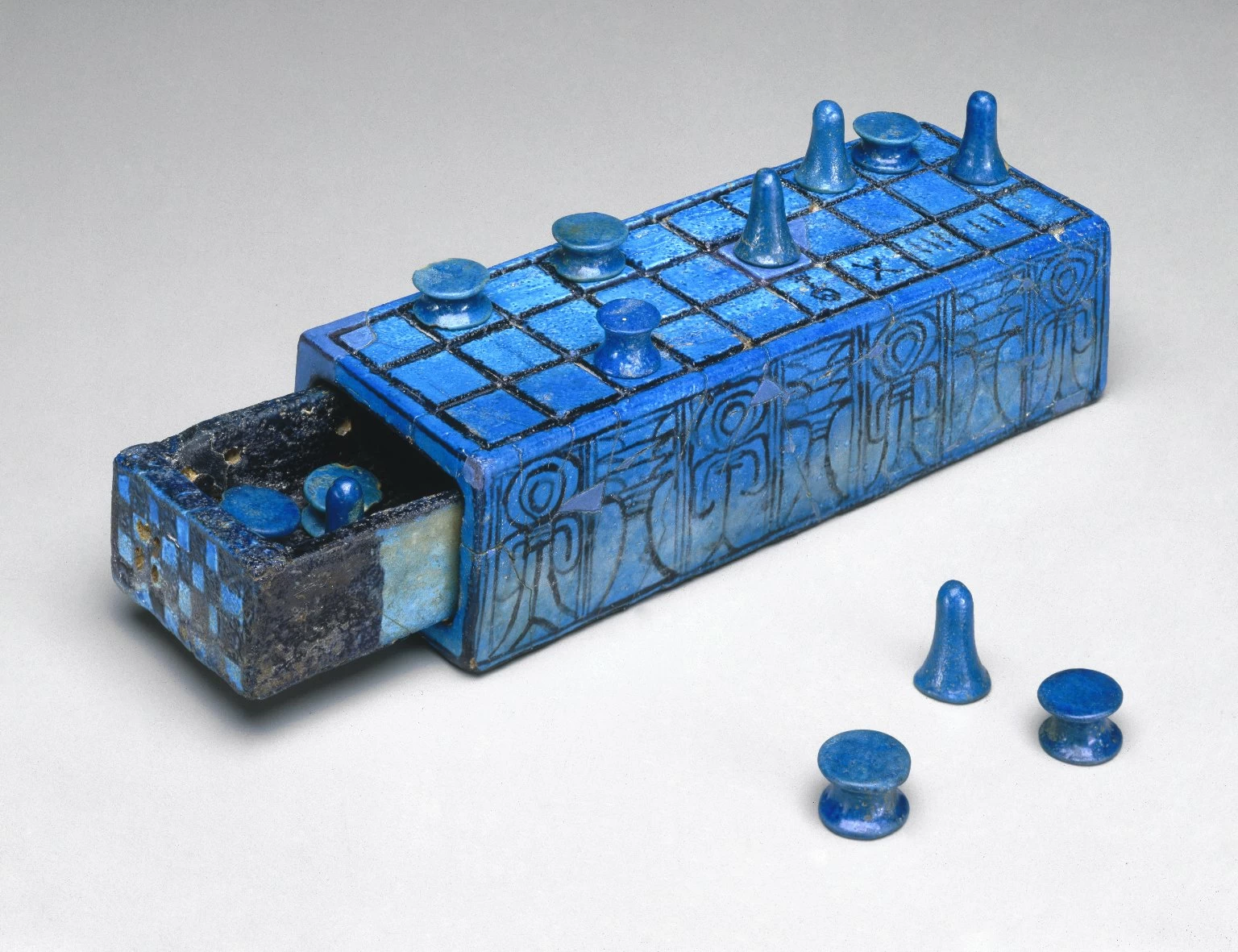
Archaeological Significance
Archaeological discoveries have played a pivotal role in uncovering the origins of games. Artifacts like game boards, pieces, and depictions in art have provided invaluable insights into how these games were played and their significance in ancient societies. These archaeological findings are not just remnants of ancient leisure activities; they are windows into the past, revealing the daily lives, beliefs, and interactions of our ancestors.
Board games likely originated in the ancient Near East, with the earliest pieces found in Turkey dating back 5,000 years. The Royal Game of Ur, dating back to 2600-2400 BCE, was known across ancient civilizations and had astronomical significance.
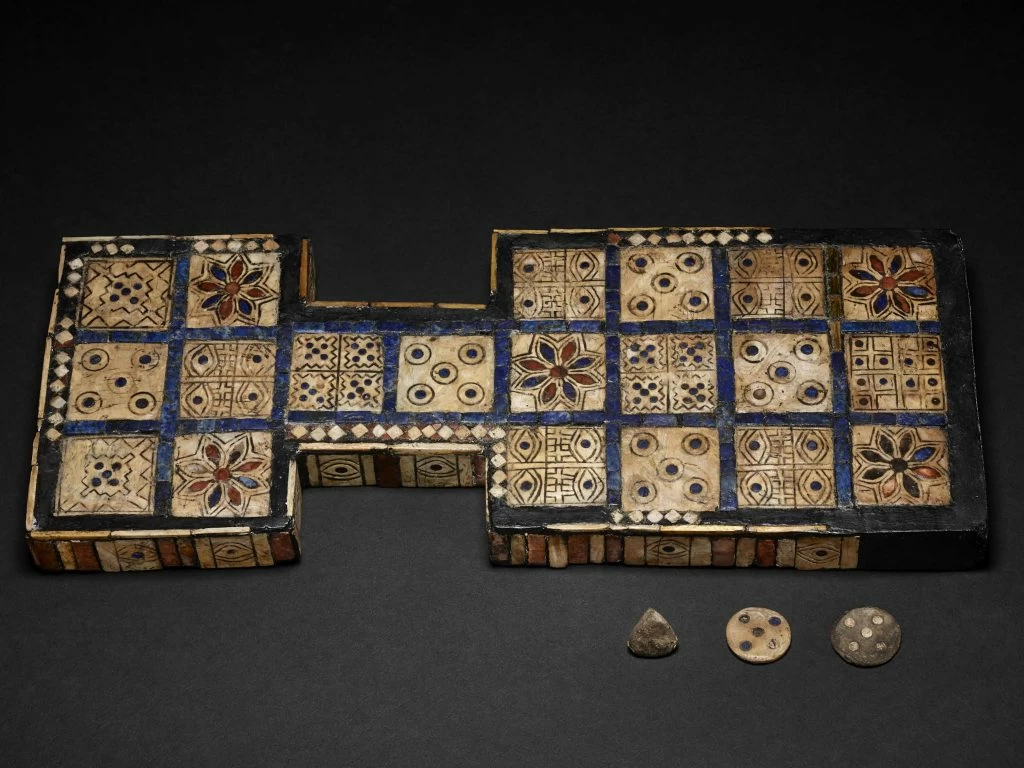
Complexity and Spread in Ancient Civilizations
Ancient Greece and Rome had a variety of games including Episkyros, Harpastum, and Tic-tac-toe, reflecting the diversity and spread of games throughout these cultures. Post the Muslim conquest of Persia, Shatranj (chess) spread to the Arab world, evolving with the cultural context.
In India, games like Chaturanga, the precursor to chess, developed around the Kushan or Gupta periods, symbolizing military strategy. Other games like Carrom and Snakes and Ladders originated in the Indian subcontinent, each with unique cultural significance.
- Chinese Contributions – China contributed significantly with games like Liubo, Go, and Xiangqi (Chinese Chess), each reflecting different aspects of Chinese culture and society. The invention of playing cards in China during the Tang Dynasty further exemplifies the region’s influence on global game history.
- African Gaming Traditions – Mancala, one of the most widespread native African games, possibly the oldest in the world, showcases the diversity of African cultural heritage.
- Games in the Americas – In the Americas, games like Patolli and the Mesoamerican ballgame were popular, reflecting the indigenous cultures of the region.
- European Developments – In Northern Europe, the Tafl games, played across Germanic and Celtic societies, are an example of the region’s unique gaming traditions. Chess, which reached the Iberian Peninsula in 822, spread throughout Europe, adapting to local cultures.
- Medieval Contributions – The Libro de los juegos, commissioned by Alfonso X of Castile in 1283, is a significant medieval source, containing descriptions and illustrations of various games.
The history of games is a testament to human creativity and cultural exchange. From the ancient Near East to Europe, Asia, Africa, and the Americas, games have evolved, mirroring the societal, religious, and intellectual contexts of their times. They have served as teaching tools, as reflections of social status, and as integral parts of cultural ceremonies and rituals. Through games, we can trace the development of strategic thinking, social interaction, and cultural values across civilizations, providing a rich tapestry of our shared human heritage.
All Ancient Games
Mancala: Africa’s Ancient Game of Sowing and Counting
In the sun-drenched villages of Africa, beneath the shade of ancient baobabs and along the dusty streets of bustling markets, a game has been played…
Mehen: The Coiled Serpent Game of Ancient Egypt
Long before the grandeur of the pyramids and the mystique of Senet captivated the imagination of ancient Egypt, there existed a game of spiraling mystery…
Latrunculi: The Lost Roman Strategy Game of Military Tactics
In the shadow of the Colosseum, within the regimented confines of military encampments along Hadrian’s Wall, and in the elegant villas of patrician families, ancient…
The History and Origins of Sic Bo: From Ancient China to Modern Casinos
Sic Bo, an ancient game of chance with roots deep in the soil of imperial China, represents a perfect fusion of history, culture, and modern…
History of Keno: From Ancient Chinese Lottery to Casino Classic
In the vast ecosystem of casino games, Keno occupies a unique niche. It is a game with the soul of a lottery but the heart…
History of Craps: From Medieval Hazard to America’s Favorite Dice Game
Walk onto any bustling casino floor, and you will inevitably be drawn to the loudest, most energetic table—the one surrounded by a crowd cheering, groaning,…
History of Mahjong: From Ancient Social Game to Casino Classic
Few games in the world command the same blend of cultural reverence, social significance, and high-stakes gambling appeal as Mahjong. To the uninitiated, it is…
The History and Origins of Roulette
Roulette—literally “the little wheel”—is among the most enduring institutions of gambling and a touchstone for debates about chance, probability, and risk. Its history is not…
Rota Fortunae: How the Roman Wheel of Fortune Became the Ancestor of Roulette
Have you ever wondered where Roulette, the iconic game with the spinning wheel, actually comes from? Its roots delve deep into Roman antiquity, to a…
Circus Maximus: The Roman Origin of Modern Sports Betting
Before the existence of online sportsbooks, point spreads, and fantasy leagues, there was the roar of 250,000 fanatics, the thunder of hooves, and the thrill…
Biribi and Hoca: The Italian Games That Created the Blueprint for Roulette
While the concept of a spinning wheel of fortune is ancient, the direct, modern form of Roulette has a much clearer family tree. Before the…
Vingt-et-Un: The Original French Card Game That Became Blackjack
Every single casino game has a story, but few have a lineage as clear and direct as Blackjack. Before it was known by its modern…
Navia aut Caput: The Roman Coin Toss That Became Baccarat’s Core Bet
Baccarat is often seen as a game of sophistication and complexity, played in high-limit rooms with intricate rituals. Yet, at its very core, the game’s…
Tesserae and Tali: How Roman Dice Games Became the Ancestor of Craps
The unmistakable sound of dice tumbling across a felt table is a cornerstone of the modern casino experience. But this thrilling game of chance has…
Hero’s Vending Machine: The Ancient Greek Device That Inspired the Slot Machine
When you think of the origins of the slot machine, you might picture the dusty saloons of the American Old West. But the fundamental mechanical…
The White Pigeon Game: How an Ancient Chinese Lottery Became Keno
Keno, with its grid of numbers and lottery-style gameplay, is a fixture in casinos worldwide. Its origins, however, are not found in Europe or America,…
Life and Death on the Court: The Mesoamerican Ball Game
Picture a roaring crowd, a heavy rubber ball moving with deadly speed, and two teams competing on a stone court where the stakes were often…
The Strategic Giants: An Introduction to Go and Xiangqi
While the civilizations of the Near East were creating the foundational race games of the West, an entirely different and equally profound gaming culture was…
The Art of Ancient Strategy: Thinking Like a Master Gamer
You can know the rules to a dozen ancient games, but knowing how to win them is another matter entirely. Beyond the movement of the…
The Royal Game of Ur: A 4,500-Year-Old Mystery
The Royal Game of Ur is a Sumerian board game that belongs to the broader family of ancient Middle Eastern games commonly known as the…
Beyond the Pharaohs: Unearthing the Lost Games of Civilization
The Royal Game of Ur, Senet, Go, Chess – these are the titans of ancient gaming, monumental artifacts of human intellect and culture. But what…
Hnefatafl & Tawlbwrdd: The Great War Game of the Vikings
Long before Chess conquered the world, the halls of Viking jarls and the campfires of Norse raiders were alive with the tense, strategic battles of…
Seega: Egypt’s Forgotten Game of Strategy
When we think of ancient Egyptian games, our minds often drift to the grand, spiritual journeys of Senet or Aseb, games found resting beside pharaohs….
Aseb: The Mysterious Game of 20 Squares
Hidden in the tombs of pharaohs and the settlements of ancient Egypt lies a game that was as strategic as it was fascinating: Aseb, often…
Gambling in Ancient Times
Gambling, a pastime as old as civilization itself, has been a part of human culture for thousands of years. While the concept of money as…
Play Senet for free online
Click 'Roll Dice' to start!
Game Rules
Senet – Ancient Egyptian Game
Race to position 30 to win!
- Roll dice (1-5) to move forward
- First to reach position 30 wins
- Moves beyond 30 are invalid
- Light piece = You, Dark piece = AI
Hnefatafl – Tablut
Hnefatafl, meaning King’s Table (or literally, Fist Board Game) in Old Norse, is an asymmetric game of pure strategy played by the Vikings and neighboring…
Poprad Game Board
In the past week there has been a lot of buzz on the internet about the Poprad Game Board, which was found in Poprad, Slovakia, back…
Rota
Roman Rota Game in the Old Forum, Leptis Magna, Libya. Photo: Pablo Novoa Alvarez, 2011. Origin and Discovery Rota, a game from ancient Rome, is…
Nine Men’s Morris
Nine Men’s Morris, carved on the floor of the platform between the Bell Tower and the Dome of Diocletian’s Mausoleum in Split, Croatia. Photo: Helen…
Nard – The Original Backgammon
Nard (نرد), originally called Nardashir (نردشیر), is a Persian game, which is played on a backgammon board. The modern backgammon and its variations originated with…
Hounds and Jackals
Game of Hounds and Jackals. Middle Kingdom, Dynasty 12. Reign of Amenemhat IV. ca 1814–1805 BCE. Egypt, Thebes, pit tomb CC25. Ebony, Ivory. The Metropolitan…
